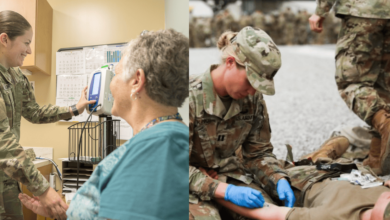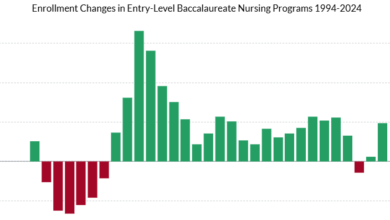CQC challenged over ‘less need for GPNs’ comment

A new Care Quality Commission (CQC) report has attracted backlash over a line about nursing associates being used in primary care instead of registered nurses.
Nursing leaders and general practice nurses (GPNs) reacted with “horror” to the wording in the CQC’s state of health and adult social care report for 2022-23, which has been published today.
However, the CQC said the line had been misinterpreted.
“General practice nurses play an indispensable role in primary care, as is well evidenced”
Crystal Oldman
The section of the report in question outlines different approaches taken by local authorities to health and social care workforce development.
It states: “Despite the recognised challenges for staffing, very few authorities have published workforce strategies.
“They report working with service providers in different aspects of workforce development and recruitment, such as setting up academies to train and develop staff, training to upskill people to care for people with more complex medical needs, and working with primary care on nursing associate roles where there is less need for registered nurses.”
The reference to there being “less need” for registered nurses in primary care, and to nursing associates being used instead, sparked outrage among the profession.
Although in response, the CQC clarified that the line was referring to the use of “nursing associate roles, overseen by registered nurses, for tasks that do not require a registered nurse to complete”.
Among those criticising that section of the report was Louise Brady, national primary care nursing lead at NHS England.
On the social media platform X, formerly known as Twitter, she wrote: “In what context are registered nurses not necessary? Our code of conduct is explicit.
“We supervise and have direct oversight of work undertaken by our [nursing associate] colleagues.”
Addressing the CQC, Ms Brady added: “Do please contact me at NHSE nursing directorate to talk through the empirical evidence and impact.”
Meanwhile, one GPN said: “This is horrifying… GPNs already feel massively undervalued.”
Another added: “Are you joking [CQC]? GPNs are the most holistic and multi trained professionals in general practice. This [is] utter rubbish.
“Splitting the role into smaller ones does not make an effective safe environment for patients. I am astounded at this shortsightedness.”
Leading nursing workforce academic Professor Alison Leary also raised concerns.
Professor Leary has long spoken about the need to avoid substitution of registered nurses with other roles, including nursing associates, in order to protect patient safety.
Speaking to Nursing Times, she said the December 2021 Sonnet Report about the role of GPNs was “clear about the value of [registered nurses] in primary care who deliver millions of episodes of primary care”.
She added: “It is concerning that the CQC does not share this view or demonstrate the evidence base on staffing for safety and quality.”
“To be clear, we do not say there is less need for registered nurses”
CQC spokesperson
Similarly, Dr Crystal Oldman, chief executive of the Queen’s Nursing Institute, said: “It is unclear on what basis the CQC believes there is less of a need for registered nurses in primary care.
“It is in fact quite the opposite with general practice requiring more not fewer registered nurses.
“General practice nurses play an indispensable role in primary care, as is well evidenced,” added Dr Oldman.
“Nursing associates are not a substitute for the expert work of the general practice nurse.
“There is a clear need for a growing registered nurse workforce in primary care if we are to deliver the objectives of the NHS Long Term Plan and improve individual and population health.”
Nursing associates are regulated by the Nursing and Midwifery Council (NMC) and the role was introduced to sit at a level between healthcare support workers and registered nurses.
The role only exists in England and the first qualified nursing associates joined the NMC register in 2019.
At the time, unions and others warned against nursing associates being used as registered nurses and said the introduction of the new role should not be seen as a solution to nurse shortages.
In response to the backlash, a CQC spokesperson said: “To be clear, we do not say there is less need for registered nurses.
“This section is reporting on what different local authorities have said they are doing regarding workforce development in their areas.
“One of the examples of things that local authorities said they were doing around workforce development was using nursing associate roles, overseen by registered nurses, for tasks that do not require a registered nurse to complete.”






